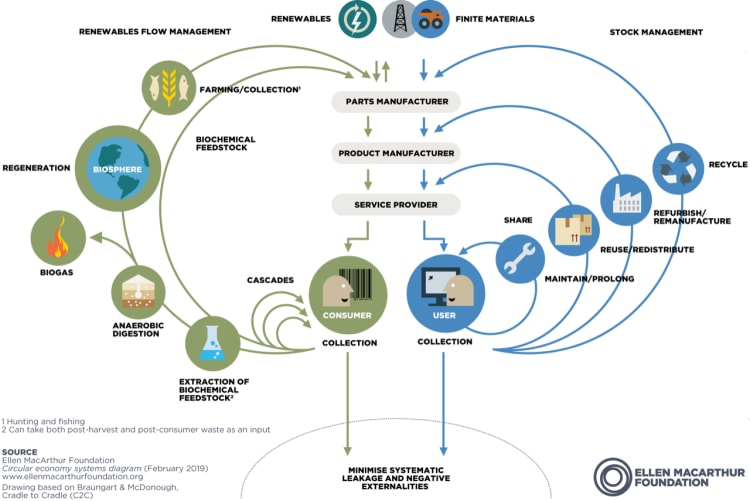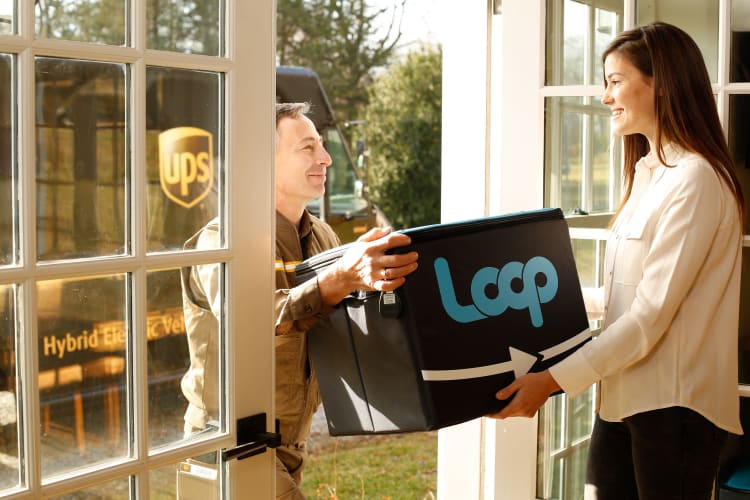
A circular economy is one that is restorative and regenerative by design. It takes “a systemic approach to economic development that is designed to benefit businesses, society, and the environment.” So says the Ellen MacArthur Foundation, the UK-based organization widely seen as the leading proponent for the concept. In contrast to the “take-make-waste” linear model, notes EMF, a circular economy aims to gradually decouple growth from the consumption of finite resources. It is based on three key principles: design out waste and pollution, keep products and materials in use and regenerate natural systems.

The circular economy principle, explains the Ellen MacArthur Foundation, involves moving away from the “take-make-waste” linear model, and decoupling growth from the consumption of finite resources.
The plastics and rubber industries are increasingly focusing on at least some of these principles as they strive to meet increasingly stringent environmental regulations, reduce overall material use, find ways to effectively recycle and reuse products and materials, and develop more environmentally friendly materials such as those that are bio-based rather than petrochemical-based. Following is just a tiny sampling of some of the types of actions currently taking place.
PolyREC takes flight
In mid-March four of Europe's major plastics industry associations - PlasticsEurope, Petcore Europe, VinylPlus, and Plastics Recyclers Europe - announced they have teamed up on an initiative called PolyREC. This concept aims to use a shared data-collection system called RecoTrace to monitor, verify, and report plastics recycling volumes and uptake data in Europe. This, the participants say, will allow those involved to provide traceability, transparency, and trust in recycled materials along the entire plastics value chain.
“Setting up mechanisms that evidence progress in driving plastic circularity in a transparent manner is a must if we are to meet the EU targets,” said PRE President Ton Emans. PolyREC plans to use a RecoTrace system that has been built on the Recovinyl platform, which VinylPlus developed and has been using for 20 years to collect recycling data. VinylPlus Managing Director Brigitte Dero stated that the circularity of plastics is a key opportunity to enhance the overall sustainability of plastics products.
In the Loop
One of the higher-profile efforts to promote reuse in the consumer packaged goods arena is being driven by Loop – a circular shopping platform started in 2019 by New Jersey-based entrepreneur Tom Szaky, who also heads the initiative’s parent company, Terracycle. Launched initially in the northeastern U.S. and in Paris, the Loop program has now expanded to the U.K., Canada, and across all 48 contiguous U.S. states, with plans to begin operating in Germany, Australia and Japan this year.
The system uses a parcel-delivery service to ship a variety of food, household cleaning, and personal-care products in a reusable and collapsible, padded container called the Loop tote. The products are dispensed from reusable containers, which are returned in the same container when empty. Some call this “the milkman model,” referring to the old days when milk was delivered to your doorstep in glass bottles, which later were collected, cleaned and reused.
“Loop,” says Szaky, “is an engine for CPGs [consumer packaged goods companies] to shift from disposable products that consumers own to durable ones they borrow.” So, with the brand owner actually owning their product’s packaging, they have the incentive to devise attractive, durable, cleanable packages that can be reused at least 100 times. This leads to the design of refillable containers, with the aim of eliminating the single-use, disposable packages that dominate retail shelves (and landfills) today.

▲The Loop system involves delivery and pickup of commonly used consumer items that are refillable and reusable.
Loop has many major organizations as partners -such as Danone, Procter & Gamble, Unilever and retails chains such as Carrefour Group – with dozens of leading brands participating. Terracycle, which operates in 20 countries and focuses on recycling difficult-to-recycle products, has ambitious plans to keep expanding Loop globally.
Bio-friendly straws using Smart Plastic

Smart Plastic Technologies says its bio-assimilation additive technology enables products such as these just-introduced PP straws to completely degrade, leaving behind no microplastics.
Smart Plastic Technologies LLC of Wheeling, Illinois, has taken a different path. It has developed its SPTek ECLIPSE bio-assimilation technology for use in polyolefins such as polyethylene and polypropylene to allow them to totally degrade.
Using this patent-pending technology, Smart Plastic has just introduced polypropylene drinking straws that it says “will truly and completely biodegrade, resulting in nothing more than CO2, water and biomass. Following its guaranteed life, the straw will bio-assimilate in marine, terrestrial and landfill environments within 12–42 months, resulting in zero microplastics.”
It is estimated that consumers use as many as 500 million plastic straws in the U.S. alone every day, prompting companies such as Starbucks to ban them at their stores. That works out to about 182.5 billion straws a year. Even if each such straw weighs only about 0.4 grams, that equals roughly 73,000 metrics tons of plastic straws per year. While the overall environmental impact is not huge, in the scheme of things, every bit of waste reduction helps.
More importantly, Smart Plastic President and Chief Operating Officer Jay Tapp says he sees many potential applications not only for its SPTek Eclipse technology, but for several other sustainable additives that he believes will contribute to a new generation of eco-friendly plastics and dramatically reduce plastic waste.



